Lost and Found (1979 film)
Last updated| Lost and Found | |
|---|---|
 US theatrical release poster | |
| Directed by | Melvin Frank |
| Written by |
|
| Produced by | Melvin Frank |
| Starring |
|
| Cinematography | Douglas Slocombe |
| Edited by | Bill Butler |
| Music by | John Cameron |
Production company | Gordon Film Productions |
| Distributed by | Columbia-EMI-Warner Distributors |
Release date |
|
Running time | 106 minutes |
| Language | English |
| Budget | $6 million [2] |
| Box office | $1.8 million (US rentals) [3] |
Lost and Found is a 1979 British romantic comedy film co-written and directed by Melvin Frank and starring George Segal and Glenda Jackson.
Contents
Featuring much of the same cast and crew as Frank's 1973 film A Touch of Class , this film follows a couple's constant meeting and clashing.
It marked Martin Short's film debut.
Plot
While visiting Switzerland, an American college professor, Adam, keeps running into a divorced British secretary, Patricia, wherever they go. First their cars collide. Then they smash into one another on a ski slope, each breaking a leg.
In between numerous quarrels, the two develop lust and love. They hastily marry, but the disagreements continue. Patricia decides to leave, so Adam decides to fake a suicide. They lose and find each other, again and again.
Cast
- George Segal as Adam Watson
- Glenda Jackson as Patricia Brittenham
- Paul Sorvino as Reilly
- Maureen Stapleton as Jemmy
- Martin Short as Engel
- Ken Pogue as Julian
- John Candy as Carpentier
Reception
Roger Ebert of the Chicago Sun-Times gave the film 1 star out of 4 and opened his review by stating: "This movie is terrible. It's awful. It is inconceivable to me that the same people who made A Touch of Class had anything to do with it, but they did." [4] Janet Maslin of The New York Times wrote, "Lost and Found is reasonably breezy, but it has neither authenticity nor glamour; instead, it settles for a homeyness that borders on the drab. If Mr. Segal and Miss Jackson aren't one of those fabulous couples one can never quite believe are made of flesh and blood, neither are they plausible as just plain folks who are happily in love. The script insists upon a strong sexual bond between them, but neither performance suggests any such thing. The characters inflict a lot of pain upon each other, which makes it even harder to see what keeps them together." [5] Variety called the film "a pleasant enough romantic comedy that manages to evoke laughter more often than not," though in comparison to A Touch of Class, "the new picture has neither the charm or style of 1973 picture, depending too much on forced physical comedy." [6]
Gene Siskel of the Chicago Tribune gave the film 2 stars out of 4 and wrote, "Unfortunately, the biggest problem with Lost and Found is that George Segal's character simply is not worth Jackson's attention ... Within the world of this trivial comedy, Segal is presented as cute when actually he is a menace, a menace to himself and to any woman who would place her trust in him. Jackson's character recognizes this, but the 'cute' script doesn't allow her to walk away permanently." [7] Charles Champlin of the Los Angeles Times was also negative, writing, "When the romantic comedy can't make its make-believe believable, the results (hinting of beads of perspiration on the brow and cigarette butts beside the typewriter in the cold gray dawn) are more likely to make the teeth ache. The elusive binding ingredient is charm. Ms. Jackson can speak rapid-fire scorn as well as any actress working, and in full wrath she is wonderful to behold, but in Lost and Found it is a lost cause." [8] Gary Arnold of The Washington Post slammed the film as "a disgrace" and "the ugliest, unfunniest 'comedy' to litter the American screen since 'Fire Sale.'" [9] Jack Kroll stated in Newsweek , "In his belated zeal to mix laughter and 'life,' Frank has forgotten to make his movie likable." [10] Clyde Jeavons of The Monthly Film Bulletin wrote, "Saddled with a leaden script and a plot which relies heavily on contrivance, slapstick and would-be black humour, Segal and Jackson—far from making the sparks fly—look distinctly uncomfortable in each other's company, and only the latter wins through on sheer technique and pragmatic English charm." [11]
The film was a box-office failure. [3]
Related Research Articles
Romantic comedy is a subgenre of comedy and slice of life fiction, focusing on lighthearted, humorous plot lines centered on romantic ideas, such as how true love is able to surmount most obstacles. In a typical romantic comedy, the two lovers tend to be young, likeable, and seemingly meant for each other, yet they are kept apart by some complicating circumstance until, surmounting all obstacles, they are finally united. A fairy-tale-style happy ending is a typical feature.

A Touch of Class is a 1973 British romantic comedy film produced and directed by Melvin Frank and starring George Segal, Glenda Jackson, Hildegarde Neil, Paul Sorvino and K Callan. The film tells the story of a couple having an affair, who find themselves falling in love. It was nominated for five Academy Awards, including Best Picture, with Jackson winning Best Actress.
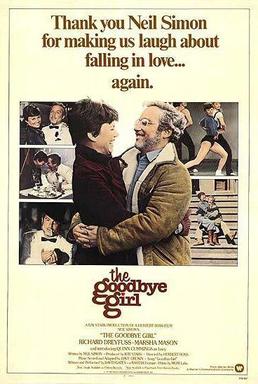
The Goodbye Girl is a 1977 American romantic comedy-drama film directed by Herbert Ross, written by Neil Simon and starring Richard Dreyfuss, Marsha Mason, Quinn Cummings and Paul Benedict. The film, produced by Ray Stark, centers on an odd trio of characters: a struggling actor who has sublet a Manhattan apartment from a friend, the current occupant, and her precocious young daughter.

Starting Over is a 1979 American comedy film based on Dan Wakefield's 1973 novel, produced by James L. Brooks, and directed by Alan J. Pakula. Starring Burt Reynolds, Jill Clayburgh, and Candice Bergen, it follows a recently divorced man who is torn between his new girlfriend and his ex-wife.

Quintet is a 1979 American post-apocalyptic science fiction film directed by Robert Altman. It stars Paul Newman, Brigitte Fossey, Bibi Andersson, Fernando Rey, Vittorio Gassman and Nina Van Pallandt.
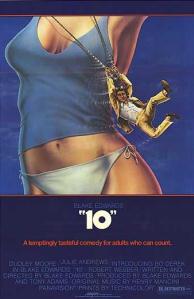
10 is a 1979 American romantic comedy film written, produced and directed by Blake Edwards and starring Dudley Moore, Julie Andrews, Robert Webber and Bo Derek. It was considered a trendsetting film at the time of its release and became one of the year's biggest box-office hits. The film follows a middle-aged man who becomes infatuated with a young woman whom he has never met, leading to a comic chase and an encounter in Mexico.
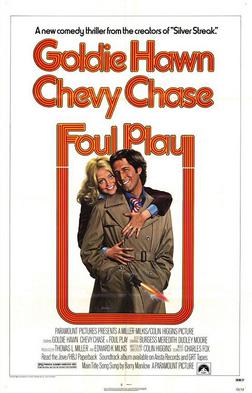
Foul Play is a 1978 American romantic neo-noir comedy thriller film written and directed by Colin Higgins, and starring Goldie Hawn, Chevy Chase, Dudley Moore, Burgess Meredith, Eugene Roche, Rachel Roberts, Brian Dennehy and Billy Barty. In it, a recently divorced librarian is drawn into a mystery when a stranger hides a roll of film in a pack of cigarettes and gives it to her for safekeeping.

Seems Like Old Times is a 1980 American comedy film starring Chevy Chase, Goldie Hawn, and Charles Grodin, directed by Jay Sandrich and written by Neil Simon. It was the only theatrical film directed by Sandrich, who was best known for his television sitcom directing work.
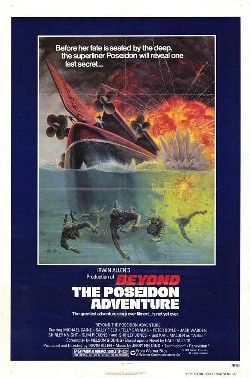
Beyond the Poseidon Adventure is a 1979 American action adventure drama disaster film and a sequel to The Poseidon Adventure (1972) directed by Irwin Allen and starring Michael Caine and Sally Field. It was a critical and commercial failure, and was the only Allen disaster film to receive no Academy Award nominations. Its box office receipts were only 20% of its estimated $10 million budget.
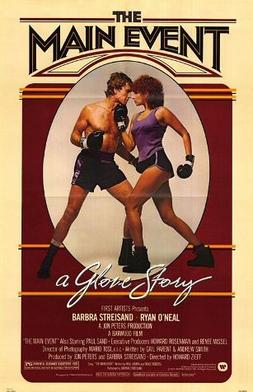
The Main Event is a 1979 American sports romantic comedy film starring Barbra Streisand and Ryan O'Neal, written by Gail Parent, directed by Howard Zieff, and produced by Renée Missel and Howard Rosenman.
Melvin Frank was an American screenwriter, film producer and film director. He is known for his partnership with Norman Panama and their work on films such as Mr. Blandings Builds His Dream House (1948), White Christmas (1954), and The Court Jester (1956). He also directed films such as Buona Sera, Mrs. Campbell and A Touch of Class (1973).

White Lightning is a 1973 American action film directed by Joseph Sargent, written by William W. Norton, and starring Burt Reynolds, Jennifer Billingsley, Ned Beatty, Bo Hopkins, R. G. Armstrong and Diane Ladd. It marked Laura Dern's film debut.

Sunburn is a 1979 British-American comedy detective film directed by Richard C. Sarafian and written by James Booth, John Daly and Stephen Oliver. It is based on the novel The Bind by Stanley Ellin. The film stars Farrah Fawcett, Charles Grodin, Art Carney, Joan Collins, William Daniels and John Hillerman. The film was released on August 10, 1979, by Paramount Pictures.
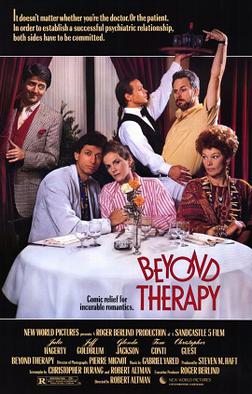
Beyond Therapy is a 1987 American comedy film written and directed by Robert Altman, based on the 1981 play of the same name by Christopher Durang. It stars Julie Hagerty, Jeff Goldblum, Glenda Jackson, Tom Conti, and Christopher Guest.
One on One is a 1977 American sports drama film starring Robby Benson and Annette O'Toole. It was written by Benson and his father Jerry Segal. It was directed by Lamont Johnson and features a soundtrack performed by Seals and Crofts.
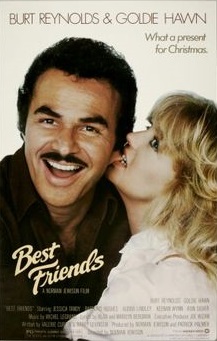
Best Friends is a 1982 American romantic comedy film starring Burt Reynolds and Goldie Hawn. It is based on the true story of the relationship between its writers Barry Levinson and Valerie Curtin. The film was directed by Norman Jewison.

The Slugger's Wife is a 1985 romantic comedy film about a baseball star who falls for a singer. Written by Neil Simon, directed by Hal Ashby and produced by Ray Stark, the film stars Michael O'Keefe, Rebecca De Mornay, and Randy Quaid. It was distributed by Columbia Pictures and released on March 29, 1985.
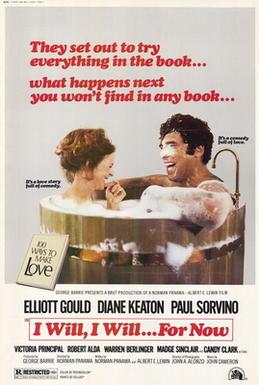
I Will, I Will... for Now is a 1976 American romantic-comedy film directed by Norman Panama. It stars Elliott Gould and Diane Keaton.
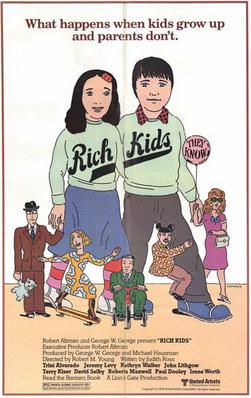
Rich Kids is a 1979 American comedy-drama film directed by Robert M. Young and starring Trini Alvarado and Jeremy Levy. It was nominated for two Young Artist Awards at the 1st Youth in Film Awards, held in 1979.

Chapter Two is a 1979 American Metrocolor romantic comedy-drama film directed by Robert Moore, produced by Ray Stark, and based on Neil Simon's 1977 Broadway play of the same name. It has a 124-minute running time. It stars James Caan and Marsha Mason, in an Academy Award-nominated performance.
References
- ↑ "Lost and Found (1979) – Details". AFI Catalog of Feature Films . Retrieved 24 June 2023.
- ↑ "Lost and Found (1979) – History". AFI Catalog of Feature Films.
- 1 2 Epstein, Andrew (April 27, 1980). "The Big Thuds of 1979—Films That Flopped, Badly". Los Angeles Times . Calendar, p. 6.
- ↑ Ebert, Roger (June 28, 1979). "Lost and Found". Chicago Sun-Times . Retrieved May 23, 2019– via RogerEbert.com.
- ↑ Maslin, Janet (July 13, 1979). "Screen: 'Lost and Found' on Campus". The New York Times . C8.
- ↑ "Film Review: Lost And Found". Variety . June 27, 1979. 18.
- ↑ Siskel, Gene (June 28, 1979). "Not much to look for in feeble 'Found'". Chicago Tribune . Section 2, p. 11.
- ↑ Champlin, Charles (June 22, 1979). "If At First You Succeed..." Los Angeles Times . Part IV, p. 1.
- ↑ Arnold, Gary (June 22, 1979). "Ruinous Reunion: Lost Among the Stars". The Washington Post . E2.
- ↑ Kroll, Jack (July 9, 1979). "This Time Out, a Touch of Crass". Newsweek . 70.
- ↑ Jeavons, Clyde (July 1979). "Lost and Found". The Monthly Film Bulletin . Vol. 46, no. 546. p. 149.
External links
Text is available under the CC BY-SA 4.0 license; additional terms may apply.
Images, videos and audio are available under their respective licenses.